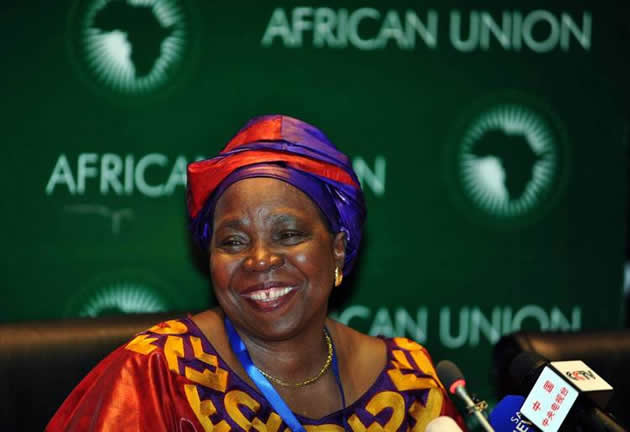Africa maritime security, safety and development

Nkosazana Dlamini Zuma Correspondent
MARITIME security, safety and development are critical to the blue economy. This subject is a prominent feature in our ongoing discussions to secure a united, prosperous and peaceful Africa. An unknown author is quoted as saying, “Eternity begins and ends with the oceans tides.” This is very relevant given that Africa’s oceanic space is three times larger than its land mass. From a nutritional perspective, fish makes a vital contribution to the nutrition and food security of over 200 million Africans and provides income to millions more.
It is also a well-known fact that 38 AU member states are either coastal countries or island states. The blue economy is very important to all of us, including those that are landlocked, because we all use maritime highways for imports and exports. In a nutshell, Africa’s development and broad security largely relies on the oceans and seas, as well as our internal water bodies.
Africa has several opportunities to effectively utilise and manage its marine resources. These opportunities include sustainable practices in energy, fishing, maritime transport and tourism, industrialisation, logistics insurance, amongst others. Therefore, because the maritime space can contribute to our economic and social development, we must build on the Aspirations of Agenda 2063. This will ensure that we meet our ultimate goal of eradicating poverty in one generation. It will also contribute to our unity.
The maritime domain is also home to our mineral resources. We must, therefore, pay attention to developing our refinery industries as we add value to extracted oil and gas. We must ensure that these refineries do not further and degrade our marine environment.
Consequently, we must map out all our marine resources. Despite the abundantly obvious potentials, Africa still stands at a crossroads in relation to the accrued benefits presented by the blue economy. Not more than 1 percent of seafarers and just 1,8 percent of ships globally are African owned, whereas over 90 percent of Africa’s imports and exports are conducted by sea.
Consequently, although exports and imports are processed through our oceans, seas and waterways, we are not receiving the requisite benefits, including the jobs. Even though, the economic value of the blue economy for Africa is estimated at over one trillion US dollars, with hundreds of thousands of job opportunities for young African women and men.
Let us request international shipping companies operating in our oceans, seas and inland waters to help create career opportunities in the maritime sector for our young men and women. As a start, we could talk to these companies to train our young women and men, and offer them employment whilst we build our industries. We also extend this invitation to our partners, whom we have begun to engage.
The increasingly intense uses of the oceans, seas and inland waters combined with the effects of climate change and use of toxic substances in the exploitation of marine resources, have also added to the pressure on the marine environment. We now know that coastal and marine ecosystems also play a significant role in mitigating the impact of climate change as they could serve as carbon sinks.
The paradox is that the marine and coastal areas in Africa are among the most vulnerable areas due to the impact of practices such as dumping and pollution. These negative practices flourish mainly because of our lack of presence in utilisation and protection of our oceans and seas. It is therefore critical that we pay focussed attention to our oceans, seas and waterways. It is important because if you have an asset you must secure and protect that asset.
Challenging our protection endeavours is the rise of maritime insecurity in Africa’s seas as a result of illegal, unreported and unregulated fishing, toxic waste dumping, and human, weapons and narcotics trafficking, amongst others. These pose threats to human and global security, and in turn have major effects on essentials such as food, energy and sustainable development.
To this end, we have developed the 2050 Africa Maritime Strategy: “to foster increased wealth creation from Africa’s oceans and seas by developing the blue economy in a secure and environmentally sustainable manner.” This is entirely in line with our 50- year vision of Agenda 2063: The Africa We Want”, which envisages that we reach our full potential, in a lifetime, by (among others) establishing flourishing and prosperous societies.
We must find a common ground and practical ways to realise our objectives. The required actions and instruments should address the governance of our own oceans, seas and waterways. I propose that we consider establishing a panel of legal experts who could help clarify our own maritime domains, including the continental shelf for each country, in accordance with existing international instruments.
By clarifying these issues, we will have a better understanding of our safety and security areas, whilst also exploring the potential area for our development.
We must pay attention to the dimensions that can secure our collective nutrition, food security, development, the promotion of inclusive growth by among others securing the inclusion and participation of women, financing for all our actions, developing African human resources, skills and research in the maritime sector and strengthening our partnerships amongst ourselves and the rest of the world which will accrue to us all the necessary outcomes which we desire from the blue economy.
H.E. Dr Nkosazana Dlamini Zuma is African Union Commission Chairperson. This article is reproduced from the African Executive.






Comments